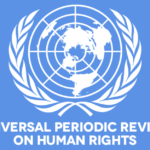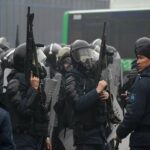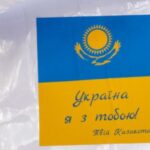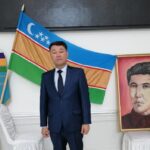Astana/Brussels, 15 October 2015
Manfred Nowak, United Nations (UN) Special Rapporteur on torture from 2004 to 2010 and member of the advisory board of International Partnership for Human Rights (IPHR), Brigitte Dufour (IPHR), Yevgeniy Zhovtis (Kazakhstan International Bureau for Human Rights and Rule of Law, KIBHR) and Miguel Martin Zumalacarregui (World Organisation against Torture, OMCT) met government officials in Astana on 13 October and called on them to promptly implement the Concluding Observations issued to Kazakhstan by the Committee against Torture (CAT) in 2014 in order to end torture.
“Kazakhstan has made significant progress in its fight against torture and other forms of ill-treatment in recent years, but torture continues – KIBHR has registered over 70 allegations since the beginning of 2015 – and impunity is the norm”, said Yevgeniy Zhovtis.
The delegation met with the Deputy Justice Minster and her advisors; the Ambassador at Large of the Foreign Ministry; and an official of the Prosecutor General’s Office. The delegates regret that it was not possible to meet with the Interior Ministry and other agencies they had requested to meet, including the Ombudsman and the National Human Rights Commission under the President of Kazakhstan.
On 12 October, prior to the meetings with government officials, Manfred Nowak, Brigitte Dufour and Miguel Martin Zumalacarregui met eleven representatives of the NGO Coalition against Torture in Kazakhstan for a briefing on the Coalition’s key concerns and recommendations.
In November 2014, when the CAT last reviewed Kazakhstan’s compliance with its obligations as a state party to the Convention against Torture and Other Cruel, Inhuman and Degrading Treatment or Punishment, it commended Kazakhstan for setting up a National Preventive Mechanism (NPM), for strengthening legal safeguards of detainees in the Criminal Procedure Code and for other important legislative changes. However, it highlighted that “allegations of torture and ill-treatment committed by law enforcement officials, including the threat of sexual abuse and rape, (persisted)” and that “the data based on official sources reveal(s) that less than 2 per cent of the complaints of torture received by the State have led to prosecutions”.
“If you really want to eradicate torture, you must adopt a comprehensive anti-torture strategy”, said Manfred Nowak. “First of all, as has also been recommended by the CAT, a special body should be established that is tasked with conducting prompt, impartial, thorough and effective investigations into all allegations of torture and ill-treatment. This body has to be fully independent of the police. It could be set up under the Department of Special Prosecutors at the General Prosecutor’s Office of Kazakhstan, whose employees currently lack investigative powers.“
Another issue of concern to the NGO delegates was the transfer of authority over the penitentiary system back to the Ministry of the Interior in 2011, after the government had made progress by placing it under the authority of the Ministry of Justice in 2002. Thus, Kazakhstan was the first country in Central Asia to have taken this important step, but also to revert it.
“The fact that it is the Ministry of the Interior that is again in charge of places of detention following an unexpected and rushed decree is worrisome when it comes to detainees’ rights, as the risk of torture is significantly higher. Kazakhstan must urgently reverse this decision and ensure the full transfer of control over places of detention and investigation to the Ministry of Justice, a step that does not require complex institutional changes”, said Brigitte Dufour.
While welcoming the establishment of the NPM, the delegation told government officials that major shortcomings substantially limiting its functioning needed to be addressed.
“In order for Kazakhstan’s “Ombudsman+” model to work adequately, the NPM needs to be able to operate with more independence from the Ombudsman. NPM members should have the powers to decide by themselves and with full independence on all visits they wish to carry out and be able to publish reports immediately after their visits”, said Manfred Nowak.
In addition, Coalition members and the international delegates stressed the importance of adopting a general law to govern the functioning of the NPM as well as its mandate and powers. A clear legal framework should replace the current inadequate provisions that are scattered in various parts of the legislation and letters of assurances which complement the current laws.
A last issue raised during discussions with government officials was the need to ensure the prompt implementation of UN treaty body decisions on individual cases. While two torture victims, whose cases were subject to decisions by UN treaty bodies, have since been awarded compensation for moral harm by civil courts in Kazakhstan, the perpetrators have not been punished in any of the cases ruled on by UN treaty bodies. A proper legal framework is needed to be able to ensure the full implementation of such decisions.
“The CAT requested Kazakhstan to submit information by 28 November 2015 on key torture-related concerns. We urge the authorities to use this opportunity to demonstrate their continued commitment to end torture and to implement the recommendations raised by the CAT and our delegation“, Miguel Martin Zumalacarregui concluded.
For further information and interviews with any of the organizations issuing this statement, please contact:
Brigitte Dufour, Director, International Partnership for Human Rights (IPHR): phone: +32 473 36 38 91, email: brigitte.dufour@iphronline.org / Anne Sunder-Plassmann, IPHR: phone: +49 40 3863 1458, email: anne.sunder-plassmann@iphronline.org
Yevgeniy Zhovtis, Kazakhstan International Bureau for Human Rights and Rule of Law: phone +7 727 249 59 62, e-mail: Eugene.zhovtis@gmail.com
Miguel Martin Zumalacarregui, Human Rights Adviser, OMCT Europe: phone: +32 2 218 37 19

















